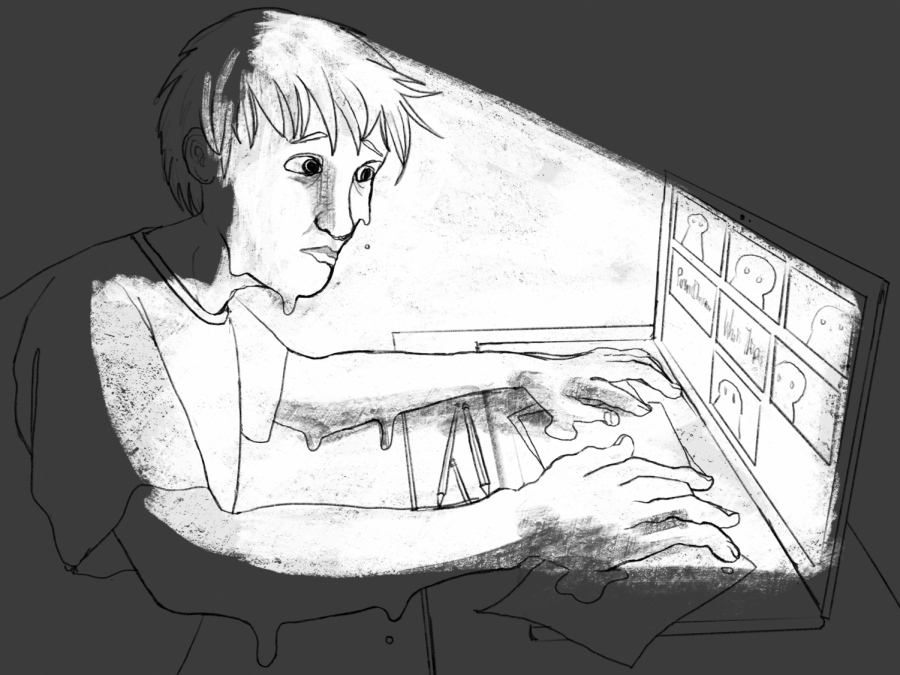Mental health should not be secondary to Covid concerns
The draining effect of spending hours upon hours in front of a computer screen, five feet away from my bed is not to be diminished by citing the risk Covid presents. As a school, we have the resources to keep those who want to stay in-person, in-person.
November 5, 2020
We need to be back in school, and we need to stay there, for the sake of our mental health.
Over the last decade, there has been a sharp increase in awareness of and treatment for mental health issues and afflictions. People are generally more open than they were ten years ago to talking about their own anxiety, depression and other mental health issues, as well as more eager to support the people around them dealing with these issues.
However, with extended periods of remote-learning at many schools, and the constant threat of closure in schools that have decided to reopen, regard for the mental health and development of young people, particularly school-age children, has dramatically diminished. Physical safety and precautions against contracting Covid-19 have become the greatest decision-making factors in everyone’s lives, at the expense of the mental health, learning and overall well-being of kids in the early days of preschool through those of us in our final year of high school.
The risk of contracting Covid-19 and passing it on to others is, of course, not to be taken lightly. Yet, data collected since the first schools reopened their doors in early August does not indicate that schools are super-spreaders of the virus. In an article published in The Atlantic on Oct. 9, Brown University economist Emily Oster presented the data from her work with data scientists on the Covid-19 in schools. So far, data collected from almost 200,000 kids from 47 states has revealed an infection rate of about 0.13 percent among students and 0.24 percent among staff.
She stated, “That’s about 1.3 infections over two weeks in a school of 1,000 kids, or 2.2 infections over two weeks in a group of 1,000 staff. Even in high-risk areas of the country, the student rates were well under half a percent.”
Throughout the pandemic there have been constant references to “essential workers,” who are, as described by the U.S. Department of Homeland Security, “those who conduct a range of operations and services that are typically essential to continue critical infrastructure operations.”
For myself and many others, some form of in-person school is essential. The experiences we have in our school-age years are formative and help us to develop healthy physical habits, social skills and an overall appreciation for the value of our education. I have always been one to love school and to be excited by learning, but while engaged in remote learning I came to dread all my classes, felt little gratification from any work I did and often enjoyed the time I spent sleeping more than that spent awake.
For those who feel physically unsafe in school there are remote options, and I’m not advocating that we should force everyone back in-person, but we are privileged to attend school at an institution that has the resources and procedures in place to remain open and keep those people who want to stay in-person on campus. State-level governments and local jurisdictions have made it possible for restaurants, gyms and retail stores to open and remain open, so why should schools be treated with any less priority?
In a recent Washington Post piece, “Remote school is putting kids under toxic stress,” pediatricians Alice Kuo and Casey Nagel observed that, “The disruption of virtual school is increasing the risk this generation of children will suffer from and die of heart disease and diabetes. It could reduce their lifelong earning potential and cripple their mental health.”
I want to be back in school for a lot of selfish reasons: some semblance of a senior year, time on campus with friends, getting to know what it’s like to drive myself to school. Staying in-person for the betterment of my mental health and educational experience is essential for me and millions of other students all across the nation.





Shelley Paulette • Nov 9, 2020 at 4:33 PM
Bravo Kate!! Great piece on mental health and I can attest to the increasing need for it. All the units where I work are full and being on a residential unit, there have been so many young people with increased anxiety and depression. This must be a very difficult time and I’m not sure if I would be able to do school remotely. Bravo to all the students at Master’s
Julie Nace • Nov 5, 2020 at 10:07 PM
Extremely well written and insightful. I know many college students who are struggling with their mental health as they try to function within strict COVID protocols on campus, or study alone remotely from home.